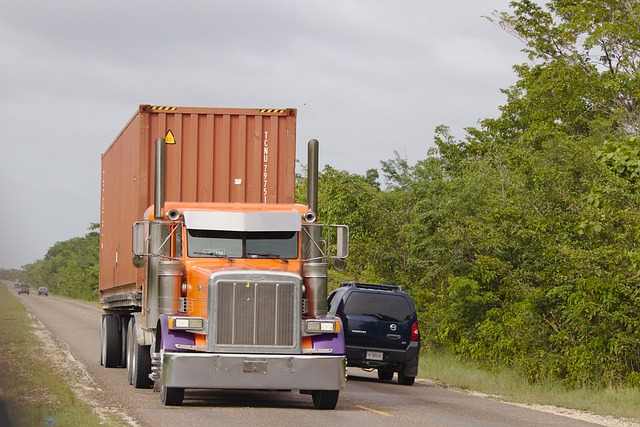In today's digital age, cargo protection for solo operators is essential to safeguard assets during transportation. By assessing potential risks like vehicle breakdowns, damage, weather incidents and personal emergencies, they can tailor contingency plans and insurance options. Integrating technology like GPS tracking and secure packaging, along with regular inspections and updates, ensures robust protection strategies. Consistent maintenance, proactive monitoring, problem-solving and record-keeping minimize downtime and maintain the integrity of their cargo protection plan.
In today’s unpredictable landscape, solo operators face unique challenges when it comes to protecting their goods. Understanding and mitigating risks through robust cargo protection plans is essential for navigating unforeseen incidents. This guide delves into the critical components of cargo protection for solo operators, equipping you with strategies to assess vulnerabilities, craft comprehensive plans, and implement reliable security measures for peace of mind. From identifying potential threats to maintaining continuous security, discover how to safeguard your cargo effectively.
Understanding the Risks: Why Cargo Protection is Essential for Solo Operators

In today’s digital era, solo operators—be they independent entrepreneurs or freelance professionals—face unique challenges, particularly when it comes to protecting their valuable assets. Understanding the risks associated with cargo and shipments is crucial for anyone navigating the complexities of solo operating. Without proper safeguards, these individuals are exposed to potential losses due to theft, damage, or even loss in transit. This risk is exacerbated by the lack of insurance coverage or support from larger organizations.
Cargo protection for solo operators serves as a vital shield against these unforeseen incidents. It offers peace of mind and financial security by ensuring that cargo remains safe during every stage of transportation. Reliable protection plans are designed to cover various scenarios, including loss, damage, delays, and even fraudulent activities. By investing in such protective measures, solo operators can mitigate risks, safeguard their investments, and continue to thrive without the constant burden of worry.
Assessing Your Needs: Identifying Potential Incidents and Their Impact

Assessing your needs is the first step in preparing for unexpected incidents. As a solo operator, consider the potential risks and incidents that could impact your business and personal life. This might include vehicle breakdowns, cargo damage or loss during transit, adverse weather conditions affecting operations, or even personal emergencies that may require you to be away from your duties. Identifying these scenarios is crucial for developing an effective protection plan.
For instance, if you rely on timely deliveries for your cargo protection business, factoring in potential delays due to unforeseen events like natural disasters or road closures is essential. Similarly, having contingency plans for cargo security and insurance options tailored to solo operators can mitigate the risk of losses. By understanding these potential incidents, you can tailor your protection strategies, ensuring you’re prepared for any eventuality, especially when operating independently.
Crafting a Comprehensive Plan: Strategies for Effective Cargo Protection

Creating a robust protection plan is paramount for solo operators navigating the complexities of cargo transportation, where unexpected incidents can arise at any moment. A comprehensive strategy involves integrating various risk management techniques and security measures to safeguard goods during transit. One crucial step is to assess the nature of the cargo, its value, and potential vulnerabilities. This initial evaluation guides the implementation of tailored protection protocols, ensuring that each shipment receives the appropriate level of care.
For solo operators, leveraging technology plays a pivotal role in enhancing cargo protection. Implementing GPS tracking systems provides real-time visibility into the location and status of cargo, deterring theft and facilitating swift response to any security breaches. Additionally, investing in secure packaging materials and load securing techniques significantly reduces the risk of damage or loss during transit. Regularly reviewing and updating protection plans based on evolving threats is essential to maintain an effective system for cargo protection for solo operators.
Implementation and Maintenance: Ensuring Reliability and Continuous Security

Implementing a reliable protection plan is only half the battle; consistent maintenance and upkeep are essential to ensure its effectiveness when unexpected incidents arise. For solo operators, especially those managing their own cargo protection, establishing a regular routine for inspection and service is crucial. This includes checking critical components such as safety gear, tracking devices, and emergency protocols. Regular updates on industry standards and best practices will help tailor these plans to changing circumstances, ensuring maximum security at all times.
Maintaining reliable systems also involves proactive problem-solving and quick response times. By keeping detailed records of maintenance activities and system performance, operators can identify potential issues early on. This proactive approach allows for timely repairs or replacements, minimizing downtime and maintaining the integrity of the protection plan. For solo operators, this means staying vigilant and adaptable, as they bear full responsibility for the security of their cargo.
In today’s unpredictable landscape, cargo protection for solo operators is not just an option—it’s a necessity. By understanding the risks, assessing your unique needs, and crafting a comprehensive plan, you can navigate unexpected incidents with confidence. Implementation and maintenance are key to ensuring reliability and continuous security, allowing you to focus on what matters most: delivering goods safely and efficiently. Remember that a robust protection plan is your first line of defense against potential losses, making it an indispensable tool for any solo operator.
